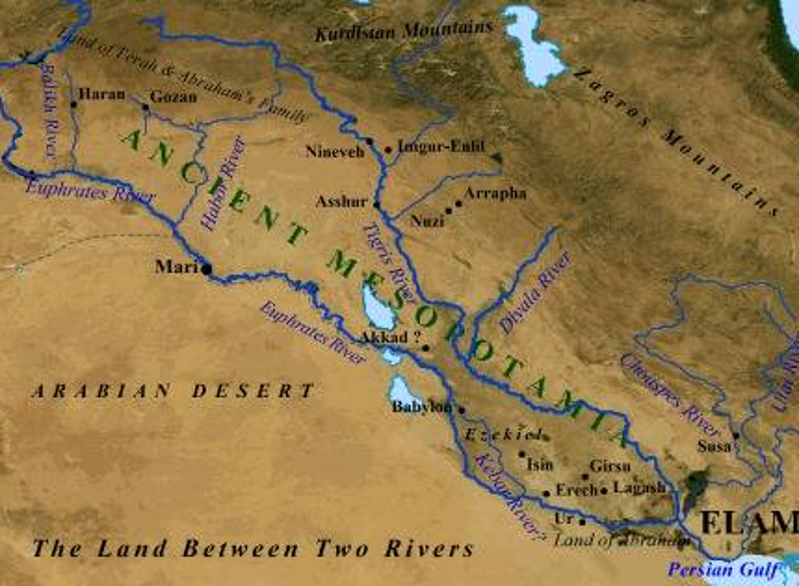Trip to Mesopotamia
I spent the last day of my trip at the most important parts of Mesopotamia, the Tigris and Euphrates rivers. You can’t visit ancient Mesopotamia without talking about the reason they exist. Andreas Angelakis and Xiao Yun Zheng talk about this in their article, Evolution of Water Supply, Sanitation, Wastewater, and Stormwater Technologies Globally. As stated in the article, “the first successful efforts to control the flow of water were driven (such as dams and irrigation systems) due to the need for food. Thus, they were implemented in Mesopotamia…. The Mesopotamians pioneered the construction of dams. The Tigris and Euphrates rivers could be unpredictable. The rivers had the potential to flood and when flooding occurs, all the crops were washed away. Thus, dams and levees were created to stop flooding and control the water. Yun Zheng and Angelakis also stated that the Mesopotamians created sanitation systems to clean the water. It should be noted that not everyone had access to clean water and sanitation. I wanted to try to use an ancient toilet but decided against it. Even with all the methods they used, I still didn’t want to risk my health. Yun Zheng and Angelakis also state in their article, “The Sumerian epics referred to the effect of uncontrolled human activity on the soil and environment to be interpreted as the curse of God, of which we now understand as the environmental effects of intense irrigation”. They are referring to one of the first pieces of literature in ancient history. They state that uncontrolled human activity was thought to be a curse sent from the gods above. In reality, it was probably just the natural world living its life. At the end of my journey I realize something, history seems to repeat itself. Similar things occur in every century. In the end, we aren’t much different than those from 2250 BCE, of course, the main difference is the technology. Still, I have a newfound respect for the ancient Mesopotamians. Even with the similarities to modern life, I still would choose to live here in 2022.
Naomi Roberts
7 chapters
29 Sep 2022
Day 6: The fertile crescent!
Mesopotamia
I spent the last day of my trip at the most important parts of Mesopotamia, the Tigris and Euphrates rivers. You can’t visit ancient Mesopotamia without talking about the reason they exist. Andreas Angelakis and Xiao Yun Zheng talk about this in their article, Evolution of Water Supply, Sanitation, Wastewater, and Stormwater Technologies Globally. As stated in the article, “the first successful efforts to control the flow of water were driven (such as dams and irrigation systems) due to the need for food. Thus, they were implemented in Mesopotamia…. The Mesopotamians pioneered the construction of dams. The Tigris and Euphrates rivers could be unpredictable. The rivers had the potential to flood and when flooding occurs, all the crops were washed away. Thus, dams and levees were created to stop flooding and control the water. Yun Zheng and Angelakis also stated that the Mesopotamians created sanitation systems to clean the water. It should be noted that not everyone had access to clean water and sanitation. I wanted to try to use an ancient toilet but decided against it. Even with all the methods they used, I still didn’t want to risk my health. Yun Zheng and Angelakis also state in their article, “The Sumerian epics referred to the effect of uncontrolled human activity on the soil and environment to be interpreted as the curse of God, of which we now understand as the environmental effects of intense irrigation”. They are referring to one of the first pieces of literature in ancient history. They state that uncontrolled human activity was thought to be a curse sent from the gods above. In reality, it was probably just the natural world living its life. At the end of my journey I realize something, history seems to repeat itself. Similar things occur in every century. In the end, we aren’t much different than those from 2250 BCE, of course, the main difference is the technology. Still, I have a newfound respect for the ancient Mesopotamians. Even with the similarities to modern life, I still would choose to live here in 2022.

Share your travel adventures like this!
Create your own travel blog in one step
Share with friends and family to follow your journey
Easy set up, no technical knowledge needed and unlimited storage!
© 2025 Travel Diaries. All rights reserved.